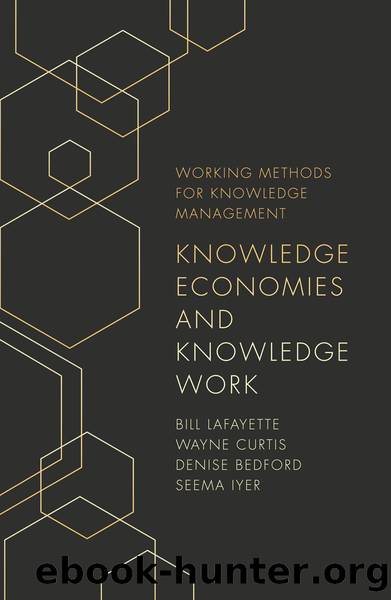Knowledge Economies and Knowledge Work by LaFayette Bill;Curtis Wayne;Bedford Denise;Iyer Seema;

Author:LaFayette, Bill;Curtis, Wayne;Bedford, Denise;Iyer, Seema;
Language: eng
Format: epub
Publisher: Emerald Publishing Limited
Published: 2019-10-04T00:00:00+00:00
describe procedural knowledge, its properties, and how we grow it; and
describe organizational culture, its properties, and how to nourish it.
REFERENCES AND SUGGESTED FUTURE READINGS
Adler, P. S., & Heckscher, C. C. (Eds.). (2006). The firm as a collaborative community: Reconstructing trust in the knowledge economy (pp. 11â106). Oxford: Oxford University Press.
Banks, A. P., & Millward, L. J. (2007). Differentiating knowledge in teams: The effect of shared declarative and procedural knowledge on team performance. Group Dynamics: Theory, Research, and Practice, 11(2), 95.
Bontis, N. (1998). Intellectual capital: An exploratory study that develops measures and models. Management Decision, 36(2), 63â76.
Chan Kim, W., & Mauborgne, R. (1998). Procedural justice, strategic decision making, and the knowledge economy. Strategic Management Journal, 19(4), 323â338.
Corbett, A. T., & Anderson, J. R. (1994). Knowledge tracing: Modeling the acquisition of procedural knowledge. User Modeling and User-Adapted Interaction, 4(4), 253â278.
Edmondson, A. C. (2012). Teaming: How organizations learn, innovate, and compete in the knowledge economy. Hoboken, NJ: John Wiley & Sons.
Friedland, P. (1981, August). Acquisition of procedural knowledge from domain experts. In IJCAIâ81 Proceedings of the 7th international joint conference on artificial intelligence, Vancouver, BC, Canada, August 24â28 (Vol. 2, pp. 856â861). San Francisco, CA: Morgan Kaufmann Publishers Inc.
Lewicki, P., Czyzewska, M., & Hoffman, H. (1987). Unconscious acquisition of complex procedural knowledge. Journal of Experimental Psychology: Learning, Memory, and Cognition, 13(4), 523â530.
Roos, J., Edvinsson, L., & Dragonetti, N. C. (1997). Intellectual capital: Navigating the new business landscape. New York, NY: Springer.
Saint-Onge, H., & Armstrong, C. (2012). The conductive organization. Abingdon Routledge.
Saint-Onge, H., & Klein, P. (2005). The power of shared knowledge. Optimize, 4(5), 63â74.
Saint-Onge, H., & Wallace, D. (2012). Leveraging communities of practice for strategic advantage. New York, NY: Routledge.
Ten Berge, T., & Van Hezewijk, R. (1999). Procedural and declarative knowledge: An evolutionary perspective. Theory & Psychology, 9(5), 605â624.
Willingham, D. B., Nissen, M. J., & Bullemer, P. (1989). On the development of procedural knowledge. Journal of Experimental Psychology: Learning, Memory, and Cognition, 15(6), 1047â1060.
Download
This site does not store any files on its server. We only index and link to content provided by other sites. Please contact the content providers to delete copyright contents if any and email us, we'll remove relevant links or contents immediately.
The Brazilian Economy since the Great Financial Crisis of 20072008 by Philip Arestis Carolina Troncoso Baltar & Daniela Magalhães Prates(133697)
International Integration of the Brazilian Economy by Elias C. Grivoyannis(108963)
The Art of Coaching by Elena Aguilar(53178)
Flexible Working by Dale Gemma;(23284)
How to Stop Living Paycheck to Paycheck by Avery Breyer(19713)
The Acquirer's Multiple: How the Billionaire Contrarians of Deep Value Beat the Market by Tobias Carlisle(12308)
Thinking, Fast and Slow by Kahneman Daniel(12249)
The Radium Girls by Kate Moore(12013)
The Art of Thinking Clearly by Rolf Dobelli(10444)
Hit Refresh by Satya Nadella(9121)
The Compound Effect by Darren Hardy(8941)
Tools of Titans by Timothy Ferriss(8363)
Atomic Habits: Tiny Changes, Remarkable Results by James Clear(8319)
Turbulence by E. J. Noyes(8040)
A Court of Wings and Ruin by Sarah J. Maas(7809)
Change Your Questions, Change Your Life by Marilee Adams(7753)
Nudge - Improving Decisions about Health, Wealth, and Happiness by Thaler Sunstein(7689)
How to Be a Bawse: A Guide to Conquering Life by Lilly Singh(7466)
Win Bigly by Scott Adams(7183)
